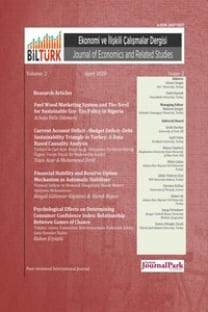The Effect of Biodiesel Market on Economic Growth: Policies in the European Union & Turkey
Öz The production of biodiesel, which is one of the modern bio fuels, has been soaring up. Biodiesel is a product used as fuel which is produced through appropriate chemical / biochemical processes of oils derived from vegetable such as canola (rapeseed), sunflower, soy, etc. or animal fats. Biodiesel produced from vegetable oils and animal fats is different from petroleum based diesel in chemical structure; however, it is equivalent to petrol in function. It is possible to use biodiesel as pure or after blending it with petroleum based diesel in any kind of diesel engine, without any modifications on the engine or with some minor changes. Biodiesel has taken an important place in energy and agriculture policies as this kind of fuel not only contributes to different issues such as providing security of energy supply, maintaining agricultural development and struggling with global warming, but it also increases the vegetable oil production and enables recycling of vegetable oil wastes. The aim of this study is to examine the structure of biodiesel markets in the EU and Turkey and the relationship between fuel production and economic growth with panel data analysis, and to evaluate the effects of implemented policies.
Anahtar Kelimeler:
Energy, Energy Policy, Alternative Energy Resources, Biodiesel, Panel Data Analysis
___
Al-Mulali U. (2015). The Impact of Biofuel Energy Consumption on GDP Growth, Co2 Emission, Agricultural Crop Prices, and Agricultural Production, International Journal of Green Energy, 12(11), 1100-1106Alsaleh M. and A. S. Abdul-Rahim A.S. (2020). Bioenergy Consumption and Economic Growth in the EU-28 Region: Evidence from a Panel Cointegration Model, GeoJournal, 1-16.
Aransiola, E.F., Ojumu T.V., Oyekola, O.O., Madzimbamuto and Iknu-Omoregbei D.I.O. (2014). A Rewiev of Current Technology for Biodiesel Production: State of the art, Bıomass and Bıoenergy, 61, 276-297.
Arouri, M. El H., Youssef, A.B., M’hennş, H. and Rault C. (2012). Energy consumption, economic growth and CO2 emission in Middle East and North African countries, Energy Policy, 45, 342-349.
Aytüre, S. (2013). Avrupa Birliğinin Enerji Politikasında Son Gelişmeler ve Türkiye’ye Yansımaları, Nevşehir Hacı Bektaş Veli Üniversitesi, Sosyal Bilimler Enstitüsü Dergisi, 3, 35-51.
Baltagi, B (2001). Econometric Analysis of Panel Data, 2nd Ed., UK: John Wiley & Sons Ltd.
Bayraç, H. N. ve Çelikay, F. ve Çildir, M. (2018). Küreselleşme Sürecinde Sürdürülebilir Enerji Politikaları, Ekin Yayınları, Bursa.
Çelebi, K. A. ve Uğur A. (2015). Biyoyakıtlara Yönelik Mali Teşvikler: Türkiye Açısından Bir Değerlendirme, Hacettepe Üniversitesi İİBF Dergisi, 33 (2), 25-45.
Dağdelen D. (2015). Küresel Biyoyakıt Politikalarının AB ve Türkiye Açısından İncelenmesi, T.C. Gıda Tarım ve Hayvancılık Bakanlığı, Avrupa Birliği ve Dış İlişkiler Genel Müdürlüğü, AB Uzmanlık Tezi, Ankara.
Eurostat (2016). 2020 Climate and Energy Package, (https://ec.europa.eu/clima/policies/energy-stragety/2030-energy-strategy, Date of Access: 18.08.2018). Greene, W. H. (2003). Econometric analysis. Pearson Education India.
Gujarati, D. (2004). Basic Econometrics. United States Military Academy, West Point.
Horuz, A. ve Korkmaz A, ve Akınoğlu, G. (2015). Biyoyakıt Bitkileri ve Teknolojisi, Toprak Bilimi ve Bitki Besleme Dergisi, 3 (2), 69-81.
Karaosmanoğlu, F. (2002). Ekojenerasyon Dünyası, Ekojenerasyon Dergisi, ICCI Özel Sayısı, 10, 50-56.
Narayan, P. K. and Narayan, SD. (2010). Carbon Dioxside Emission and Economic Growth: Panel Data Evidence from Developing Countries, Energy Policy, 38, 661-666.
Özertan G. (2008). Biyoyakıtların Türkiye’nin Enerji, Tarım, Çevre ve Kırsal Kalkınma Politikaları İçin Önemi, İktisat-İşletme ve Finans Dergisi, 23 (262), 17-34.
Pesaran, M. H. (2004). General Diagnostic Tests for Cross Section Dependence in Panels. University of Cambridge, Faculty of Economics, Cambridge Working Papers in Economics No. 0435.
Saraçoğlu, S. (2017). Yenilenebilir Enerji Kaynağı Olarak Biyokütle Üretiminin Dünyada ve Türkiye’de Durumu, Fiscaoeconomia, 1 (3), 126-155.
Sen Qiao, Xin-long Xu, Cheng Kun Liu and Hsing Hung Chen (2016). A Panel Study on the Relationship Between Biofuels Production and Sustainable Development, International Journal of Green Energy, 13 (1), 94-101.
Wetterlund, E.ve Leduc. S.ve Dotzauer, E. and Kindermann, G. (2012). Optimal Localisation of Biofuel Production on a European Scale, Energy, 41, 789-800.
Xu B., Zhong R. and Qiao H. (2020). The Impact of Biofuel Consumption on CO2 Emissions: A Panel Data Analysis for Seven Selected G20 Countries, Energy and Environment, 31(8), 1498–1514.
Yaşar, B. (2009). Alternatif Enerji Kaynağı Olarak Biyodizel Üretim ve Kullanım Olanaklarının Türkiye Tarımı ve Ab Uyum Süreci Açısından Değerlendirilmesi, Çukurova Üniversitesi, FBE, Tarım Ekonomisi ABD, Doktora Tezi, Adana.
Yorkan, A. (2009). AB’nin Enerji Politikası ve Türkiye’ye Etkileri, Bilge Strateji, 1 (1), 24-39.
Zaman K., Awan U., Islam T., Paidi R., Hassan and A., Alias bin Abdullah, (2016). Econometric Applications for Measuring The Environmental Impacts of Biofuel Production in The Panel Of Worlds' Largest Region, International Journal of Hydrogen Energy, 41(7), 4305-4325.
http://ec.europa.eu/eurostat/tgm/table.do?tab=table&init=1&language=en&pcode=tsdcc310&plugin=1/ Date of Access: 14.08.2018.
https://www.intechopen.com/books/biofuel-s-engineering-process-technology/novel-methods-in-biodiesel-production/ Date of Access: 04.08.2018.
http://www.albiyobir.org.tr/dunyada_b2.htm/date of access: 18.08.2018.
https://www.dunya.com/kose-yazisi/enerji-tarimi-sozlesmeli-uretimle-gelisiyor/411895/ Date of Access: 18.08.2018.
www.tarım.gov.tr/ Date of Access: 18.08.2018.
- Yayın Aralığı: Yılda 4 Sayı
- Başlangıç: 2019
- Yayıncı: Fatih DEYNELİ
Sayıdaki Diğer Makaleler
Factor Affecting Muslim Students Repurchase Intention of Halal Food in Yogyakarta, Indonesia
Financial Inclusion Case Study: Case of Turkey
The Effect of Biodiesel Market on Economic Growth: Policies in the European Union & Turkey
Fatih ÇEMREK, Hüseyin Naci BAYRAÇ
The Effect of Biodiesel Market on Economic Growth: Policies in the European Union & Turkey
